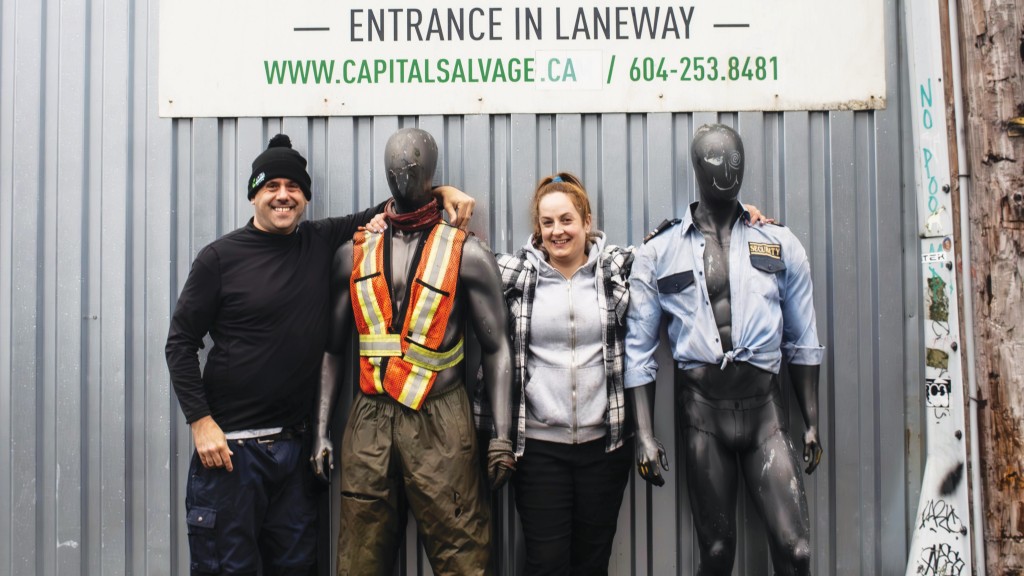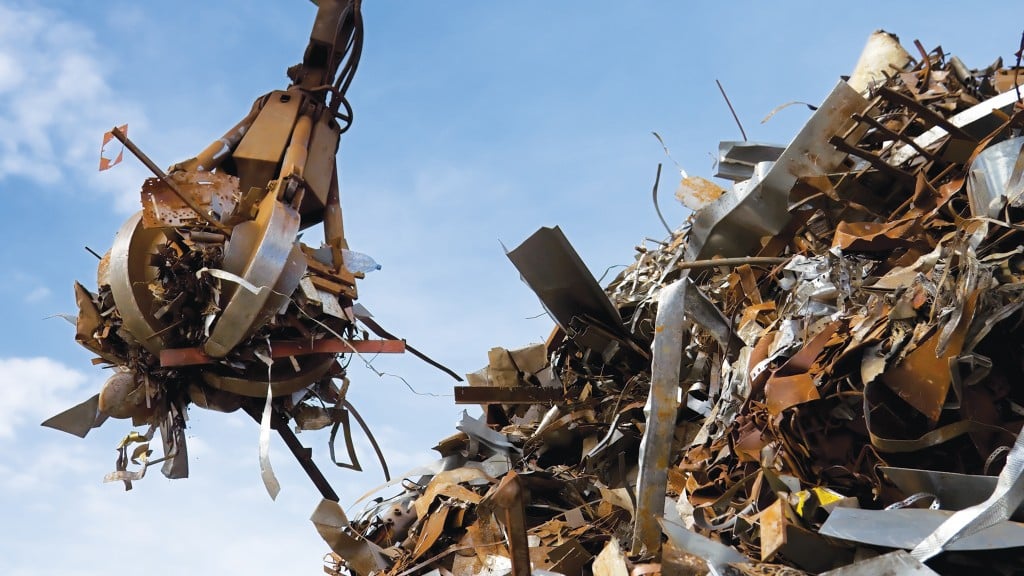From zombie weapons to metals, scrap finds a new life at Capital Salvage
With many yards adopting more corporate practices, the Dimant's operation is a throwback to a more personalized style of doing business

Walking into the Capital Salvage yard feels like stepping into an I Spy book. Everywhere you look, there's something unusual, something artsy, or something that's seen better days but still has a story to tell. Even the interview location — a rusty weight bench nestled among worn workout machines — embodies the yard's dedication to repurposing. Everything has a place here, and nothing is too rusty to find new life.
This approach to repurposing is part of a long history of scrapyards being more than just the last stop for "junk." Historically, scrapyards were lifelines for communities, offering both employment and resources when things were scarce.
These yards played a critical role during times of economic hardship, like the Great Depression and world wars, where scrap dealers provided critical resources through discarded materials. Salvagers have long had the ability to see value in what others might consider waste, keeping industries running and supporting communities.
The history of salvage
This tradition of salvage is still alive today in owners Jen and Dov Dimant's yard where there's an appreciation for every piece of scrap that comes through the gate. Capital Salvage is one of the few yards in British Columbia — let alone East Vancouver — that focuses on salvage almost as much as it does on recycling. While many other yards have adopted more corporate practices, the Dimant's operation is a throwback to an older, more personalized style of doing business.
"This is very much a dying-breed style of a scrapyard," says Dov Dimant. "There's maybe one other like us in Vancouver. Down the street, there used to be five scrapyards, so we called them the Powell Street Boys. Just go down to Powell Street and there were three side-by-side and two of them were brother-in-laws. Growing up, my grandfather's friends were scrappers."
The camaraderie between inner-city scrapyard owners created a tight-knit community that Dimant grew up around, even before he fully understood his future involvement in the business. However, the landscape has since changed significantly — larger companies have absorbed the smaller players, and many scrapyards have been priced out of the city due to the escalating costs of doing business.
Dimant realized early on that he wouldn't be competing with the big players in the industry, and that's fine with him. "There's plenty of scrap to go around. There's a place in the industry chain for us where we can succeed and the big guys can succeed," says Dimant. "In fact, they want us to succeed in doing a lot of the gathering and the sorting for them. We sell it to them, so it works for both of us."
A business built on authenticity
Dimant's approach to running his yard is distinctly personal, marked by a blend of practicality and humour. He credits the growth of his business to a simple but effective philosophy: staying true to himself.
"You go to another scrapyard and you're lucky if you can find a manager to talk to, let alone someone in ownership," Dimant explains. "Here, people are coming in and they're dealing directly with the owner."
Even during tough times, he continued to invest in maintaining this connection. "I took it to heart — spend money to make money," Dimant says, explaining how, even when finances were tight, he continued investing in customer relationships. He'd spend thousands on holiday gifts like liquor and Canucks tickets, distributing them according to the scale of business customers brought in.
"It didn't matter if it was someone pushing a shopping cart or someone driving in with a dump truck full of material. I acknowledged my appreciation," Dimant adds.
The art of salvaging materials
As one of the few scrapyards in the area open for public browsing and buying, Dimant's yard attracts a diverse crowd — daily regulars, tradespeople, and artists hunting for unique materials.
"Everything has a price," he jokes. "I'll sell you my forklift if you offer me enough."
The mix of people visiting the yard mirrors Dimant's own eclectic tastes. "I have two or three different things I like to keep," he says. "I love any random artwork, metal art, even if I don't necessarily like the piece itself. I just like that it's metal artwork, and I like that someone has spent some time on it and there was some love and care put into it for whatever reason."
His collection also includes a variety of old religious artifacts from all different cultures. Whether a Buddha statue or the Star of David, everything has its place. A big fan of The Walking Dead, he's also amassed an assortment of swords, knives, and other weapons — some functional, some just interesting. "I'm ready for the zombie apocalypse," he jokes about the collection that's "kind of gotten out of control."
A standout feature of Dimant's yard is its collection of misfit art — sculptures and oddities that didn't quite make it to the gallery but found their perfect spot here. Dimant admits to having no artistic ability of his own but credits his team for discovering these one-of-a-kind pieces both in the yard and through their pickup service which includes everything from routine material collection on construction and demolition sites to helping families clear out homes. Some of the most fascinating finds come from estate cleanups, Dimant says.
A big impact in an unexpected place
Dimant's creativity isn't limited to the yard — it extends to video productions which have become a hallmark of his operation. His first video came as part of a local business directory ad package, back when businesses were just starting to establish an online presence.
"I was always the class clown, so my goal is always to make someone laugh," Dimant says. That lighthearted approach shaped a series of fun, attention-grabbing videos, including one where he dressed as Captain Salvage in a cape, and another where he donned a pink tutu. "It's just all these little anti-corporate things that catch people's attention," he says.
These videos encapsulate the creativity of the Capital Salvage team while also serving a practical purpose. With the yard tucked away in an alley and no main street presence, standing out is critical. "Once people find out about us, they're in love with us," Dimant says. "But getting noticed is the hard part."
Quick turnaround to keep the yard organized
To ensure the yard stays efficient, quick turnaround is key. Capital Salvage operates on a high-efficiency model with no bales stacked up, waiting to be processed, or left to accumulate. "I'm not playing the markets. It's in and out," Dimant explains. "I buy all week, and by Thursday or Friday, I'm selling, trying to be mostly empty by the weekend."
The yard is open seven days a week, creating a non-stop cycle of material coming in and going out.
"For processing, it's about cleaning materials — removing steel from aluminum and cleaning copper," Dimant says. "If it fits in the bin, it's good enough." The name of the game is simplicity, efficiency, and speed.
Dimant keeps things simple, even with equipment. "We used to have a small baler, but it was more of a waste of time," he says. With limited space, he doesn't rely on large machines like cranes or skid-steer loaders. "I've got two forklifts, and that's it. I sell all my stuff locally — very locally."
Breaking ground in a tough city
While the Capital Salvage yard has been a staple in Vancouver since the 1950s, it wasn't until 1992 that Dimant's parents took over the business. Then, in 2002, life took an unexpected turn when Dimant's father passed away, leaving him to take over.
"At 22, it was kind of cool to be the big boss," Dimant admits. "It took some time to gain the respect of the industry, whether it was from people buying scrap or customers bringing it in."
Taking over a family business at such a young age wasn't all smooth sailing. The land that housed the yard was rented, which meant they could be forced out at any moment.
"At the time, I was young, so it didn't really mean much to me," Dimant explains. "But to my parents, it was always in the back of their minds that we weren't quite secure here."
The challenges didn't end there. "The City of Vancouver doesn't transfer or give new scrap licenses out, so to keep our scrap metal license, we had to stay at this address. Even if I moved across the lane, I'd lose it."
Eventually, that day arrived and the landowner listed the property for sale. At the time, Capital Salvage operated on just one lot, while the seller owned four — nearly half a block in total. With the seller unwilling to break up the lots, skyrocketing land costs, and Dimant's finances stretched thin, he had no choice but to get creative.
"The catch is that three of the four lots are deemed contaminated because there's been scrapyards here for so long. They used to drain oil, battery acid, and all that gross stuff right into the ground," says Dimant. "That complicated finances, because since it's contaminated land, the bank won't get involved. We had to fund it privately, which was stressful at the time, but I pulled some strings and made it happen."
To afford the entire four-lot package, Dimant had to sell the only clean lot. "That was the fourth lot," he says, gesturing to a building still in the midst of construction. Not an easy decision, but a necessary one.
"To make a long story short, being able to buy the property was the biggest game changer because it's now ours and we don't have to worry about getting booted off. We can make necessary renovations and changes and it's ours finally," says Dimant. "That was a sense of relief in one area, and a little bit more stress, more payments in other areas, but it worked out."
A legacy in the recycling industry
As scrapyards grow scarce in the city, Capital Salvage remains a thriving holdout that values connection and creativity as much as the materials it processes. While the goal might be to reclaim metal, it's clear that it's about more than just recycling — the true value lies in the relationships he's building, one piece of scrap at a time.
For Dimant, it's not just a business; it's a part of who he is. Despite the ups and downs, he's all in, keeping the legacy of those before him alive while adding his own twist. And, just in case, the Captain Salvage costume is always on standby.


